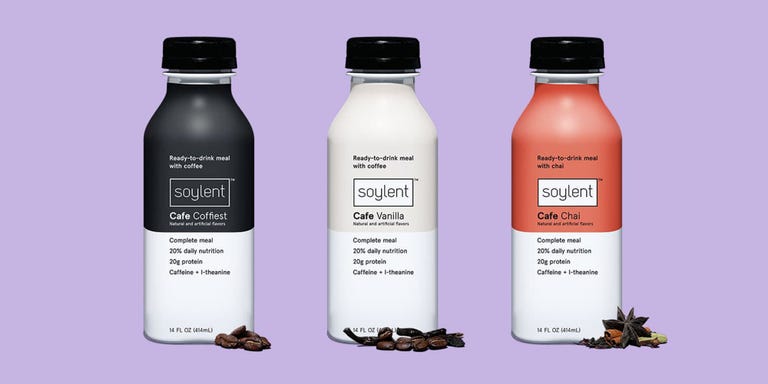

It’s beyond me why someone would rather drink their food—via smoothies, meal replacement shakes, juice cleanses—instead of, you know, actually chewing and enjoying it.
And yet, that’s the premise behind Soylent, a meal replacement drink created in 2013 by former Silicon Valley tech guy Rob Reinhart, to curb his unhealthy diet of “frozen corn dogs and ramen,” according to the drink’s website.
Because of this, Soylent is also often looked at as a weight-loss option—an easy way to keep track of calorie intake while still getting at least some nutrients (it is a meal replacement, after all).
So what’s the deal? Is it possible to fuel yourself (and lose weight) on Soylent—and would you even want to?
What is Soylent?
Soylent claims to be a complete meal, and provides 20 percent of your daily nutritional needs per 400-calorie serving. The drink does a pretty good job of covering near-equal amounts of carbohydrates, fats, and proteins—37 grams, 21 grams, and 20 grams, respectively—and is vegan, and lactose- and nut-free.
According to the drink’s website, it’s considered legal and safe by the Food and Drug Administration, since none of the ingredients are necessarily new to the market (think: soy protein, sunflower oil, and canola oil).
Though Soylent is meant to be a meal replacement, Rhinehart’s original intention wasn’t exactly to replace all food. Rather, he wanted Soylent to be a nutritious option for all those times when you should eat but feel like you don’t have time, or when, due to a lack of time, you opt for unhealthy, nutritionally empty foods (sorry, pizza bites).
Okay, but can Soylent help me lose weight?
Soylent’s not meant to be used as a weight-loss plan, explains Alissa Rumsey, R.D., but if you’re only consuming Soylent for your meals, you could lose weight.
That doesn’t mean it’s a good idea though.
When you severely restrict calories, it can lead to weight loss—but it’s not sustainable or healthy, says Rumsey. “Dieting, including food or calorie restriction, doesn’t work for long-term health and weight management,” she says. “What it does do is increase cravings and preoccupation with food and can lead to feelings of guilt associated with food, binge eating, weight fluctuations, and more.”
Limiting yourself to one specific type of food isn’t a sustainable weight loss option, either—especially if the food isn’t exactly appealing. “Soylent is made up of ingredients that have macronutrient and micronutrient values, but no one would ever eat any of those ingredients on their own,” says Rumsey. Unless, you know, you want to swig rice starch and oat fiber.
And, while none of the ingredients in Soylent are bad for you, per se, “they also aren’t necessarily providing health benefits,” other than meeting some daily requirements, says Rumsey. That means that any weight loss from Soylent is solely due to calorie restriction, not the introduction of any healthier eating habits or metabolism-boosting, fat-burning, good-for-you ingredients.
So, should I try Soylent?
If you’re the type of person who hates making breakfast first thing in the morning or tends to work through lunch, Soylent may be a good option for getting your nutrients without adding on the kind of unhealthy ingredients you’d find in processed fast foods.
But it still shouldn’t be your sole source of nutrition—and especially not solely for weight-loss purposes. “Using it from time to time isn’t necessarily bad or unhealthy,” says Rumsey, “but I would never recommend it over the experience and taste of real food.”
Another thing to remember: Food isn’t just about hitting your daily nutrient quota. “Food is something that is meant to be enjoyed, not for the vitamins, minerals, or fiber it provides, but for the taste and the pleasure it brings us,” says Rumsey. And when you enjoy your food, “you end up feeling more satisfied and content,” which actually can aid in healthy weight loss, she adds.
The bottom line: If you’re curious about Soylent, go ahead and try it—sparingly and definitely not as a replacement for all of your meals (or as a means of weight loss, for that matter).
Source: Read Full Article